小学六年级英语【一般过去时的用法】现在进行时
小学六年级重要知识归纳时态的转换与运用技巧
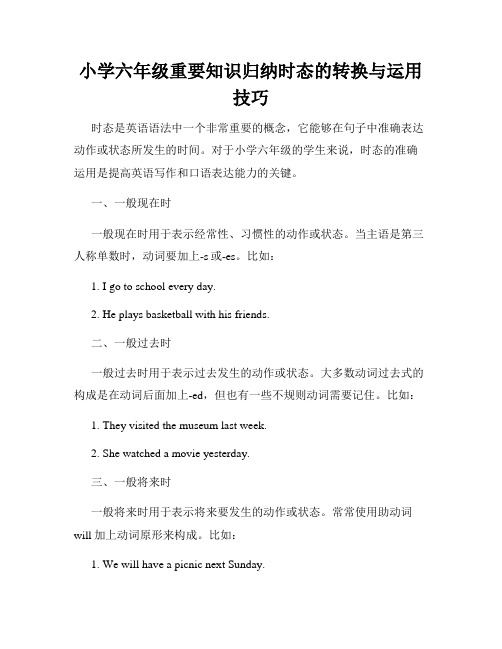
小学六年级重要知识归纳时态的转换与运用技巧时态是英语语法中一个非常重要的概念,它能够在句子中准确表达动作或状态所发生的时间。
对于小学六年级的学生来说,时态的准确运用是提高英语写作和口语表达能力的关键。
一、一般现在时一般现在时用于表示经常性、习惯性的动作或状态。
当主语是第三人称单数时,动词要加上-s或-es。
比如:1. I go to school every day.2. He plays basketball with his friends.二、一般过去时一般过去时用于表示过去发生的动作或状态。
大多数动词过去式的构成是在动词后面加上-ed,但也有一些不规则动词需要记住。
比如:1. They visited the museum last week.2. She watched a movie yesterday.三、一般将来时一般将来时用于表示将来要发生的动作或状态。
常常使用助动词will加上动词原形来构成。
比如:1. We will have a picnic next Sunday.2. He will visit his grandparents next month.四、现在进行时现在进行时用于表示现在正在进行的动作。
构成是助动词be的不同形式加上动词的现在分词。
比如:1. They are playing football in the park.2. She is eating dinner with her family.五、过去进行时过去进行时用于表示过去某个时间点正在进行的动作。
构成是助动词was或were加上动词的现在分词。
比如:1. He was studying English all night.2. They were watching a movie at that time.六、现在完成时现在完成时用于表示过去发生的动作对现在造成的影响或结果。
构成是助动词have或has加上动词的过去分词。
学习要点小学六年级的时态总结与应用
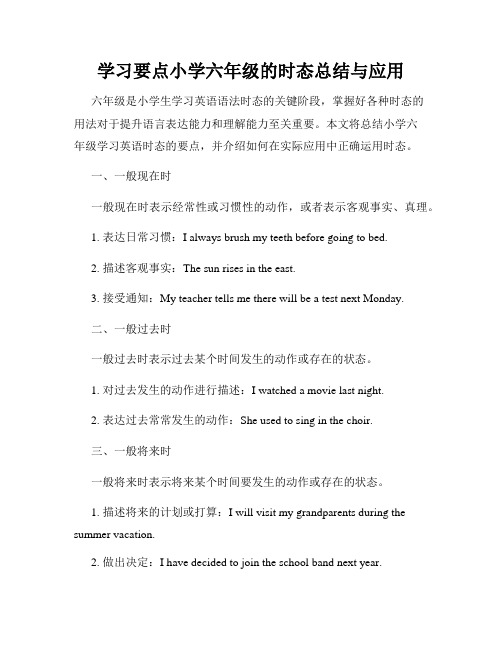
学习要点小学六年级的时态总结与应用六年级是小学生学习英语语法时态的关键阶段,掌握好各种时态的用法对于提升语言表达能力和理解能力至关重要。
本文将总结小学六年级学习英语时态的要点,并介绍如何在实际应用中正确运用时态。
一、一般现在时一般现在时表示经常性或习惯性的动作,或者表示客观事实、真理。
1. 表达日常习惯:I always brush my teeth before going to bed.2. 描述客观事实:The sun rises in the east.3. 接受通知:My teacher tells me there will be a test next Monday.二、一般过去时一般过去时表示过去某个时间发生的动作或存在的状态。
1. 对过去发生的动作进行描述:I watched a movie last night.2. 表达过去常常发生的动作:She used to sing in the choir.三、一般将来时一般将来时表示将来某个时间要发生的动作或存在的状态。
1. 描述将来的计划或打算:I will visit my grandparents during the summer vacation.2. 做出决定:I have decided to join the school band next year.3. 预测未来:I think it will rain tomorrow.四、现在进行时现在进行时表示目前正在进行的动作。
1. 描述现在正在发生的事情:I am studying for the English test.2. 反复或持续发生的动作:The children are always playing in the garden.3. 表示催促或安排:We are leaving for the airport in half an hour.五、过去进行时过去进行时表示过去某个时间正在进行的动作。
一般现在时,一般过去时,一般将来时及现在进行时
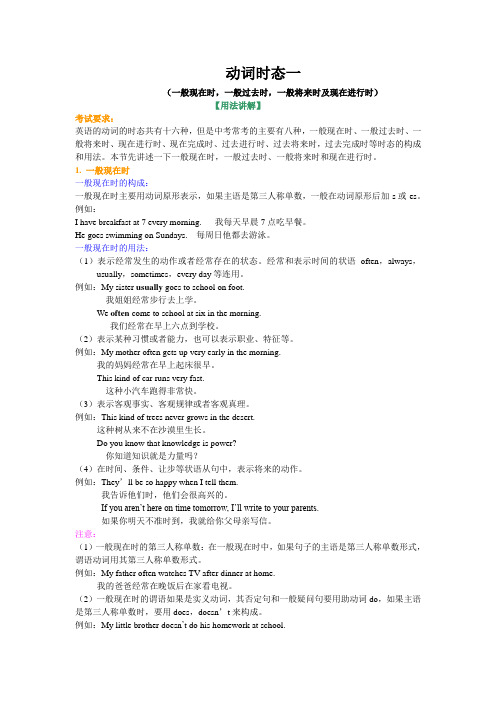
动词时态一(一般现在时,一般过去时,一般将来时及现在进行时)【用法讲解】考试要求:英语的动词的时态共有十六种,但是中考常考的主要有八种,一般现在时、一般过去时、一般将来时、现在进行时、现在完成时、过去进行时、过去将来时,过去完成时等时态的构成和用法。
本节先讲述一下一般现在时,一般过去时、一般将来时和现在进行时。
1. 一般现在时一般现在时的构成:一般现在时主要用动词原形表示,如果主语是第三人称单数,一般在动词原形后加-s或-es。
例如:I have breakfast at 7 every morning. 我每天早晨7点吃早餐。
He goes swimming on Sundays. 每周日他都去游泳。
一般现在时的用法:(1)表示经常发生的动作或者经常存在的状态。
经常和表示时间的状语often,always,usually,sometimes,every day等连用。
例如:My sister usually goes to school on foot.我姐姐经常步行去上学。
We often come to school at six in the morning.我们经常在早上六点到学校。
(2)表示某种习惯或者能力,也可以表示职业、特征等。
例如:My mother often gets up very early in the morning.我的妈妈经常在早上起床很早。
This kind of car runs very fast.这种小汽车跑得非常快。
(3)表示客观事实、客观规律或者客观真理。
例如:This kind of trees never grows in the desert.这种树从来不在沙漠里生长。
Do you know that knowledge is power?你知道知识就是力量吗?(4)在时间、条件、让步等状语从句中,表示将来的动作。
例如:They’ll be so happy when I tell them.我告诉他们时,他们会很高兴的。
六年级英语时态
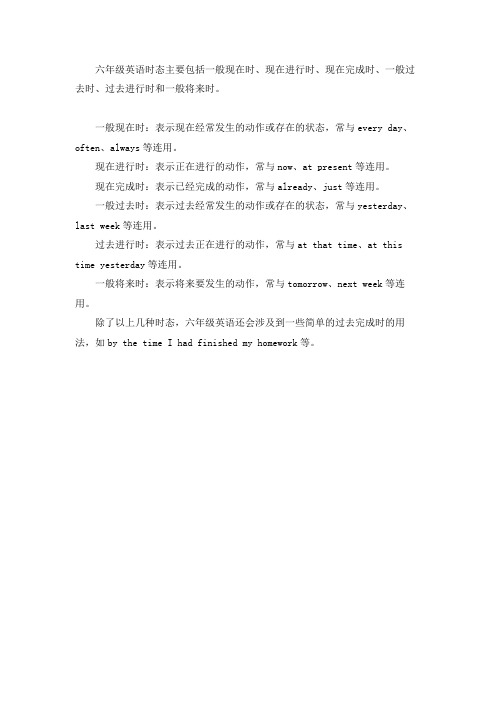
六年级英语时态主要包括一般现在时、现在进行时、现在完成时、一般过去时、过去进行时和一般将来时。
一般现在时:表示现在经常发生的动作或存在的状态,常与every day、often、always等连用。
现在进行时:表示正在进行的动作,常与now、at present等连用。
现在完成时:表示已经完成的动作,常与already、just等连用。
一般过去时:表示过去经常发生的动作或存在的状态,常与yesterday、last week等连用。
过去进行时:表示过去正在进行的动作,常与at that time、at this time yesterday等连用。
一般将来时:表示将来要发生的动作,常与tomorrow、next week等连用。
除了以上几种时态,六年级英语还会涉及到一些简单的过去完成时的用法,如by the time I had finished my homework等。
小学六年级英语-时态总结

小学六年级英语-时态总结-CAL-FENGHAI.-(YICAI)-Company One1时态总结一、一般现在时标志词:always(总是) usually(通常) often(经常) sometimes(有时) never(从不) every(每一)行为动词的词型变化形式一般现在时动词只有第三人称有词形变化,其他人称(第一人称:I, we;第二人称:you;第三人称复数:they、my friends)动词均用原形当主语是第三人称单数时,一般动词在一般现在时句子中的变化规律: 1、多数在动词后加s play—plays like—likes ,2、以s,x,sh,ch,o结尾的动词加es wash–washes catch–catches do–does3、以辅音字母加y结尾,把y改i再加es fly—flies study—studies4、以元音字母加y结尾,直接加s buy – buys5、不规则变化 have—has一般现在时基本用法功能1.表示事物或人物的特征、状态。
如:The sky is blue.天空是蓝色的。
2.表示经常性或习惯性的动作。
如:I get up at six every day.我每天六点起床。
3.表示客观现实。
如:The earth goes around the sun.地球绕着太阳转。
构成1. be动词:主语+be(am,is,are)+其它。
如:I am a boy.我是一个男孩。
2.行为动词:主语+行为动词(+其它)。
如:We study English.我们学习英语。
句型肯定句:① be动词:主语+ be + 其它成分 He is a worker.②行为动词:主语+动词(注意人称变化) +其它成分 We like the little cat.否定句:①be动词:主语+ be + not +其它成分 They are not students.②行为动词:主语+助动词(do/does) + not +动词原形+其它成分We don’t like the cat.一般疑问句:①be动词: Am / Is /Are +主语 + 其它成分Are you a teacher Yes, I am. / No, I am not.Are they students of your schoolYes they are / No they aren’t.②行为动词:助动词(Do/Does)+主语+动词原形 + 其它成分Do you like it Yes, I do. / No. I don’t.Does he (she) like itYes, he (she) does. / No, he (she) doesn’t.特殊疑问句:疑问词+ 一般疑问句①be动词: How many students are there in your school②行为动词:What do you usually do on Sunday?一般现在时动词be和 have的变化形式1.动词Be叫连系动词, 用法:第一人称单数用am,第三人称单数用is,其它人称用are。
重要知识点解析小学六年级的时态与语态
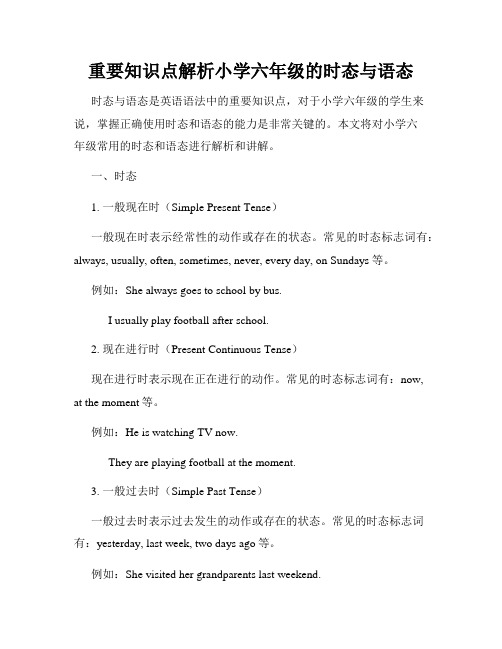
重要知识点解析小学六年级的时态与语态时态与语态是英语语法中的重要知识点,对于小学六年级的学生来说,掌握正确使用时态和语态的能力是非常关键的。
本文将对小学六年级常用的时态和语态进行解析和讲解。
一、时态1. 一般现在时(Simple Present Tense)一般现在时表示经常性的动作或存在的状态。
常见的时态标志词有:always, usually, often, sometimes, never, every day, on Sundays等。
例如:She always goes to school by bus.I usually play football after school.2. 现在进行时(Present Continuous Tense)现在进行时表示现在正在进行的动作。
常见的时态标志词有:now, at the moment等。
例如:He is watching TV now.They are playing football at the moment.3. 一般过去时(Simple Past Tense)一般过去时表示过去发生的动作或存在的状态。
常见的时态标志词有:yesterday, last week, two days ago等。
例如:She visited her grandparents last weekend.We played basketball yesterday.4. 过去进行时(Past Continuous Tense)过去进行时表示过去正在进行的动作。
常见的时态标志词有:at that time, while等。
例如:He was studying when I called him.They were talking about their trip during the break.5. 一般将来时(Simple Future Tense)一般将来时表示将来要发生的动作或存在的状态。
人教版小学六年级英语各时态结构总结及练习题(cy)
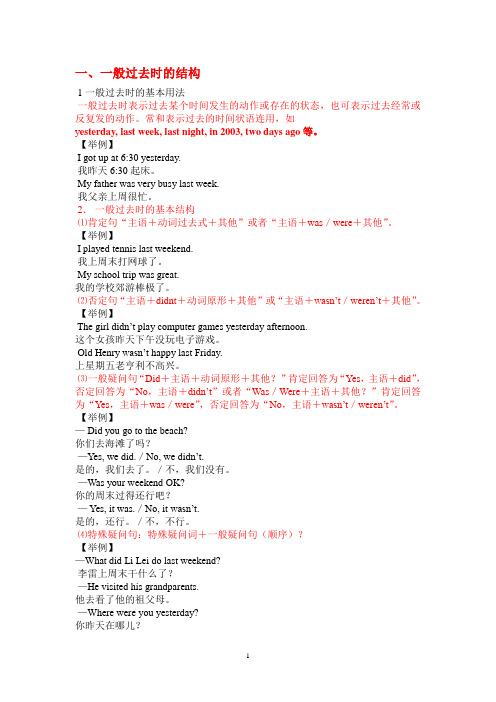
一、一般过去时的结构1一般过去时的基本用法一般过去时表示过去某个时间发生的动作或存在的状态,也可表示过去经常或反复发的动作。
常和表示过去的时间状语连用,如y esterday, last week, last night, in 2003, two days ago等。
【举例】I got up at 6:30 yesterday.我昨天6:30起床。
My father was very busy last week.我父亲上周很忙。
2.一般过去时的基本结构⑴肯定句“主语+动词过去式+其他”或者“主语+was/were+其他”。
【举例】I played tennis last weekend.我上周末打网球了。
My school trip was great.我的学校郊游棒极了。
⑵否定句“主语+didnt+动词原形+其他”或“主语+wasn’t/were n’t+其他”。
【举例】The girl didn’t play computer games yesterday afternoon.这个女孩昨天下午没玩电子游戏。
Old Henry wasn’t happy last Friday.上星期五老亨利不高兴。
⑶一般疑问句“Did+主语+动词原形+其他?”肯定回答为“Yes,主语+did”,否定回答为“No,主语+didn’t”或者“Was/Were+主语+其他?”肯定回答为“Yes,主语+was/were”,否定回答为“No,主语+wasn’t/were n’t”。
【举例】— Did you go to the beach?你们去海滩了吗?—Yes, we did./No, we did n’t.是的,我们去了。
/不,我们没有。
—Was your weekend OK?你的周末过得还行吧?— Yes, it was./No, it wasn’t.是的,还行。
/不,不行。
⑷特殊疑问句:特殊疑问词+一般疑问句(顺序)?【举例】—What did Li Lei do last weekend?李雷上周末干什么了?—He visited his grandparents.他去看了他的祖父母。
六年级上一般现在时、现在进行时、一般将来时、一般过去时讲解及专项练习

六年级上一般现在时、现在进行时、一般将来时、专项练习Class:_________ Name:_________ No:_________小学英语3种时态复习一、用动词的正确形式填空1. I ________________ (do) my homework every evening.2. We _________________ (fly) kites in the park next Sundays.3. Tom ___________(play) the piano every Saturday. Now he________ (play).4. She _______(like) swimming. She ___________ (swim) this weekend.5. Usually my mother _______ (wash) the dishes after lunch. But my grandma____________ (wash) now.6. Look at the man! He ___________ (read) a magazine.7. Look! The plane ______________ (fly) over the building.8. Listen! My aunt ____________ (sing) in the room.She is a singer. She _____ (like) singing. She _______(have) a music show. She is excited.9. Tom and Mike always ______ (swim) in the river. They _____ (swim) in the swimming pool this Sunday. Look! They ______ (swim).10. What ______ you usually ______ (do) in the evening?I _______ (play) computer games.11. What _______ you _______ (do) now?I _______ (make) a paper plane.12. What _______ he _______ (do) now?He ______ (dance).13. ______ your mother ______ (read) newspaper in the morning?Yes, She ________ .16. _______ you _______ (like) fishing?No, I ______ . I like ______ (swim),but my brother ______ (like).17. How ______ your father _______ (go) to work every day?He ______ (go) by bike. But it’s cold today. He ______ (take) the No.21 bus, 18. _______ the monkey _______ (like) climbing trees? Yes, it _______ .19. What _______ your father ______ (do) after lunch? He _______ (read) acomic book.20. ________ you ______ (collect) stamps? Yes. I _______ .________ your brother ______ (collect), too? No, he ________ .二、选择题1. _____ he _____ to the park at 6:30 in the morning? No,he _____ .A. Does; goes; doesB. Does; go; doesn’tC. Does; go; does2. Tim always _____ a picture at home. He _____ a car now.A. draws; is drawingB. draw; drawC. draws; draw3. She usually _____ her friends. They often _____ tea.A. see; drinkB. sees; drinksC. sees; drink4. He usually _____ the dishes at night, but tonight he _____ clothes.A. wash; washB. washes; is going to washC. is washing; washes5. Mr. Green usually _____ his newspaper in the evening, but he and his wife _____ television this evening.A. reads; watchesB. reads; are going to watchC. reads; watch6.Where are the man and the woman? They _____ near the tree.A. sitB. sitsC. are sitting7. _____ your father _____ diving? No, he _____ .He ______ writing stories.A.Does; like; doesn’t; likesB.Does; likes; doesn’t; likeC.Do; like; don’t; likes8. Mr. Green often _____ his newspapers at night. But he _____ an interestingbook tonight.A. reads; readsB. reads; readC. reads; is going to read9. The old man _____ playing sports in the park. He _____ morning exercisenow.A. likes; is doingB. likes; doesC. like; doing10. Where ______ the boy _____ ? He _____ across the river now.A. does; swim; swimsB. is; swimming; is swimmingC. is, swim, is swimming11. _____ you _____ to music now? Yes, we _____ .A. Do; listen; doB. Did; listen; didC. Are; listening; are12. Look! Two cats ______ across the wall.A. runB. runsC. are running13. She _____ tea, but he _____ .A. likes; doesn’t B; like; don’t C. like; doesn’t一般过去时一般过去时的构成:一般过去时是用动词的过去式来表示。
- 1、下载文档前请自行甄别文档内容的完整性,平台不提供额外的编辑、内容补充、找答案等附加服务。
- 2、"仅部分预览"的文档,不可在线预览部分如存在完整性等问题,可反馈申请退款(可完整预览的文档不适用该条件!)。
- 3、如文档侵犯您的权益,请联系客服反馈,我们会尽快为您处理(人工客服工作时间:9:00-18:30)。
一般过去时的用法 一、概念 表示在的过去某个时间里所发生的动作或存在的状态。通常在句子里找到表示过去时间的词或词组。如:yesterday,yesterday morning,yesterday afternoon,yesterday evening,the day before yesterday(前天),last night,last week,last month, last year,a moment ago(刚才),just now(刚才), two days ago,a week ago,in 1990等。 如: I went to bed at eleven last night. 昨晚我11:00睡觉。 四、动词过去式的构成规律 (一)规则动词的过去式 1.一般情况下,在动词原形后面加-ed;look→looked play→played start→started visit→visited 2.以不发音e结尾的动词,在词尾直接加-d;live→lived use→used 3.以“辅音字母+ y”结尾的动词,先将 y 改为i ,再加 –ed;study→studied, try→tried fly→flied 4.以重读闭音节(即辅音+元音+辅音)或r音节结尾,末尾只有一个辅音字母的动词,要先双写这个辅音字母后,再加 –ed。stop→stopped plan→planned, prefer→preferred (二)不规则动词的过去式 1.改变动词中的元音;begin→began drink→drank come→came eat→ate grow→grew run→ran know→knew win→won speak→spoke take→took write→wrote get→got 2.变词尾的–d 为–t ;build→built lend→lent send→sent spend→spent bend→bent 3.与动词原形一样;cut→cut put→put cost→cost hurt→hurt shut→shut 4.变-ay 为-aid (少数动词);say→said pay→paid lay→laid 5.采用不同词根;sell→sold teach→taught buy→bought 6.其他。am/is→was are→were have/has→had do→did 五、加“-ed”后的读音方法 1.ed加在清辅音后面读/t/。finished /-t/ help /-t/ asked /-t/ 2.ed加在浊辅音或元音结尾的,读/d/。played /-d/ lived /-d/ enjoyed /-d/ 3.ed加在/t/或/d/后面,读/id/。wanted /-tid/ needed /-did/ visited /-tid/ 六、句式变化 (一)一般过去时的一般疑问句 1.把was, were放在句首,其余位置不变。由Was…?引导的一般疑问句,肯定答为:Yes,… was. 否定回答为:No,…. wasn’t. 由Were…?引导的一般疑问句,肯定回答为:Yes,… were. 否定回答为:No,… weren’t. 如:(1)I was born in Shanghai. →Were you born in Shanghai?→Yes, I was. (肯定回答) →No, I wasn’t. (否定回答) (2)They were in Li Yan’s home last night. →Were they in Li Yan’s home last night? →Yes, they were. (肯定回答) →No, they weren’t. (否定回答) 2.在行为动词的句子中,要用助动词词did来引导,其余的语序不变。要注意的是,要把行为动词的过去式改为原形。肯定回答为:Yes, …did. 否定回答:No, …didn’t. 如:John played computer games last night.→Did John play computer games last night? →Yes, he did. (肯定回答) →No, he didn’t. (否定回答) (二)一般过去时的否定句 1.在表示过去存在的状态的句子中,相接在was, were的后面加上not。 如:(1)He was in the park the day before yesterday.→He was not in the park the day before yesterday. (2)We were busy last week.→We were not busy last week. 2.在表示过去的时间发生的动作的句子中,要在行为动词的前面加助动词didn’t.然后把过去式的行为动词改为动词原形。即:didn’t + 动词原形。 如:(1)She played the violin last night.→She didn’t play the violin last night. (2)They swam in the lake yesterday.→They didn’t swim in the lake yesterday. (三)、一般过去式的特殊疑问句 1.What did … ?(主要是询问过去发生了什么事情,注意要把过去式改为动词原形。) We ate Chinese food last night.→What did we eat last night? 2.Where did ?( 主要是询问过去事情发生的地方。) They sang and dance in the music room yesterday morning.→Where did they sing and dance yesterday morning? 3.Who + 动词过去式 … ?( 主要是询问过去事情发生的人物。) Mike and Tom climbed mountains last weekend. →Who climbed mountains last weekend? 二、句子结构 1.在表示某个时间里存在的状态的句子,系动词用过式was,were构成。 如:(1)I was at home yesterday. 昨天我在家。(2)We were in the gym just now. 刚才我们在体育馆。 2.在表示过去某个时间里发生的动作,用动词的过去式构成。 如:I visited my uncle yesterday. 昨天我拜访了我的叔叔。 3.各种句式 (1)一般过去时的肯定陈述句:主语 + 动词过去式 + 宾语或表语。 He worked in Shanghai ten years ago. (2)一般过去时的否定句: a.主语 + didn’t + 动词原形 + 宾语。 (did + not = didn't) He didn't do morning exercises yesterday. b.主语 + wasn’t/weren’t +表语。(was + not = wasn't were + not = weren't) He wasn't an English teacher ten years ago. (3)一般过去时的一般疑问句: a.Did + 主语 + 动词原形 + 宾语 ? Did you study English in 1990 ? b.Was/Were + 主语 + 表语 ? Was he a pupil five years ago ? (4)一般过去时的特殊疑问句: a.特殊疑问词 + did + 主语 + 动词原形 + 宾语? Where did your parents live five years ago? What did you do last Sunday? b.特殊疑问词 + were/was + 表语? Who was at the zoo yesterday? 现在进行时态的练习 通常在句子中有以下的词:now, look, listen. 句子的结构如下: be am is +动词 ing are 如:1. I am listening to the music now. 2. The students are drawing pictures now. 3. Listen! She is singing . 4. Look! Mr Li is riding a bike. 其中,动词的ing形式有如下方法: A. 在动词后直接加ing: go-going , wash-washing,fly—flying B. 以单个元音+单个辅音+e结尾 , 去掉e加ing,如 :drive—driving, ride--riding C. 某些单词要双写词尾的字母:swim- swimming run—running 练习: 1.Mr Zheng (read) a book now. 2. The rabbits (jump) now. 3.. Look ! Tom and John (swim). 4. My brother (make) a kite in his room now. 5. Look! The bus (stop). 6. We (have) an English class now. 7. Listen! Someone is (come). 8. They (catch) butterflies now. 9. He (do) an experiment now. 10. They (collect) stamps now. 11. Look! He (dive) now. 12. Tom ( watch ) TV in the dining room. 13. The doctors (get ) off the bus. 14. Come on. They ( leave ) now. 15. It (eat) fish now. 16. My father (work) in the office now. 17. Where is your mother? She (answer) the phone. 18. The teachers (run) now.
